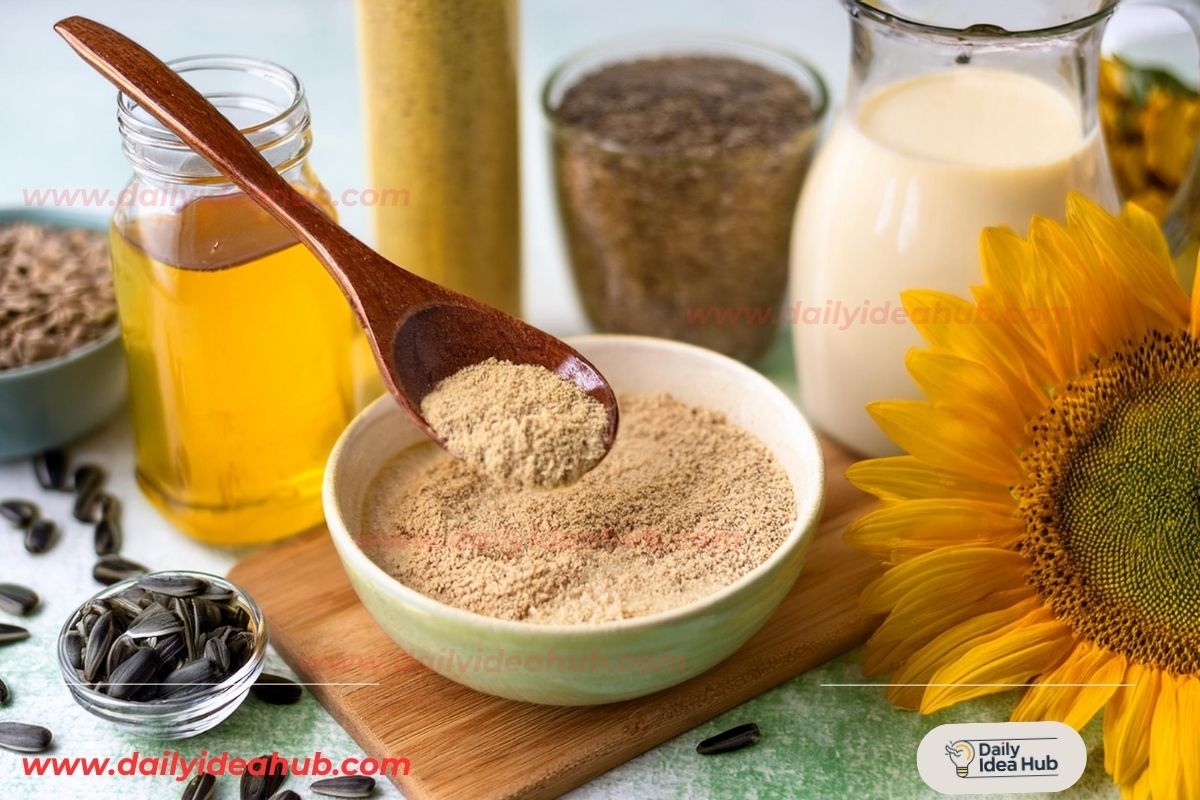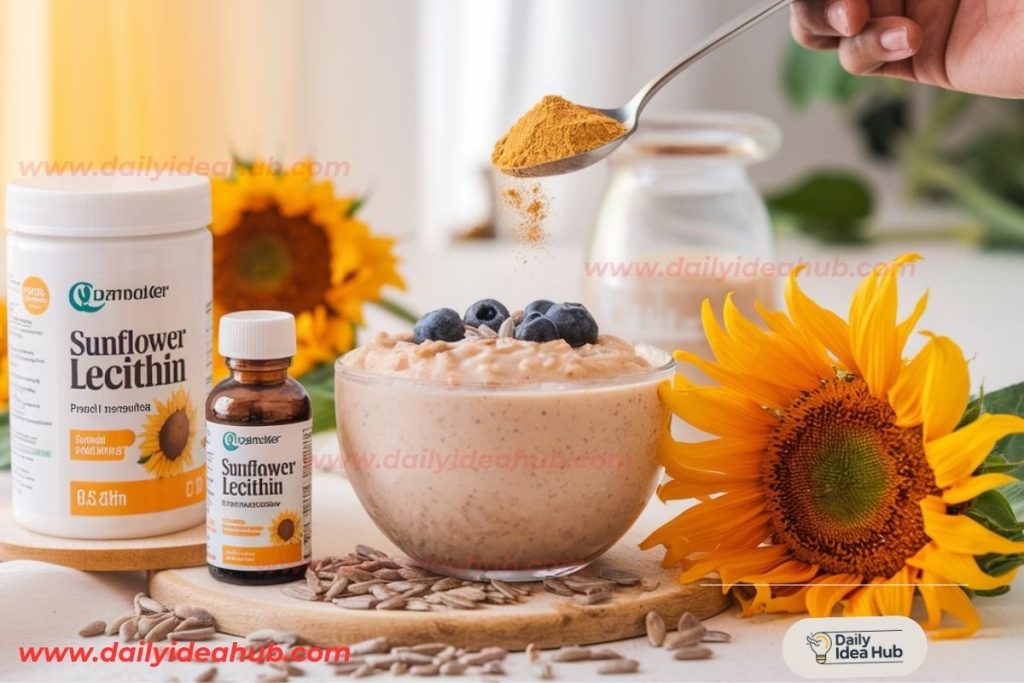
Sunflower lecithin is gaining attention for its health benefits and versatility. Whether you’re looking to improve brain function, support heart health, or promote better skin, sunflower lecithin has something to offer. But what exactly is it, and how can it benefit you? In this guide, we’ll explore everything you need to know about sunflower lecithin, from its uses to its key health benefits.
Table of Contents
Understanding Sunflower Lecithin
Sunflower lecithin is a type of fatty substance extracted from sunflower seeds. It’s part of a group of compounds called phospholipids, which are essential for cell membranes in our body. One of the things that sets sunflower lecithin apart from other types of lecithin, like soy lecithin, is its chemical-free extraction process. Sunflower lecithin is often non-GMO, making it a cleaner, more natural option for people who prefer chemical-free products.
Sunflower lecithin is widely used in foods, supplements, and even skincare products because of its emulsifying and health-boosting properties.
Sunflower Lecithin Benefits for Health
Sunflower lecithin offers a range of benefits for overall wellness. Here’s how it can improve different aspects of your health:
1. Boosts Brain Health
One of the biggest benefits of sunflower lecithin is its impact on brain health. It contains phosphatidylcholine, which is essential for producing acetylcholine, a neurotransmitter that helps with memory and learning. Regular consumption of sunflower lecithin may improve mental clarity and focus, making it an excellent supplement for students, professionals, and seniors alike.
2. Improves Heart Health
Sunflower lecithin is a great source of healthy fats, such as omega-3 and omega-6 fatty acids, which are known to promote heart health. These fats help lower cholesterol levels and prevent plaque buildup in the arteries, reducing the risk of heart disease. By balancing cholesterol levels, sunflower lecithin supports cardiovascular health and can help maintain healthy blood pressure.
3. Aids in Digestion
If you often have trouble digesting fatty foods, sunflower lecithin can help. Its emulsifying properties allow fats to be broken down more efficiently in the digestive system, making it easier for your body to absorb essential nutrients. This can be particularly helpful for individuals with digestive issues like IBS (Irritable Bowel Syndrome).
4. Supports Liver Health
Sunflower lecithin also plays a role in liver health by helping to break down fats and eliminate toxins. It promotes the breakdown of fatty deposits in the liver, reducing the risk of fatty liver disease. By improving fat metabolism, sunflower lecithin can help the liver function more effectively.
5. Promotes Healthy Skin
Lecithin is a common ingredient in skincare products due to its ability to retain moisture in the skin. Sunflower lecithin, when used in lotions or creams, helps improve skin hydration and elasticity. It can also assist in the healing of dry, cracked, or damaged skin.
Different Forms of Sunflower Lecithin
Sunflower lecithin is available in multiple forms, each of which has its specific uses. Let’s explore the most common forms:
- Powder: Sunflower lecithin powder can be easily added to smoothies, juices, and baked goods. It’s a convenient way to incorporate this nutrient into your diet.
- Liquid: The liquid form is often used in cooking or as a supplement. It blends well with sauces, soups, and salad dressings.
- Capsules: For those who prefer not to mix it into foods, sunflower lecithin is available in capsule form, which can be taken like a regular dietary supplement.
Sunflower Lecithin vs. Soy Lecithin: Key Differences
Both sunflower and soy lecithin are widely used, but sunflower lecithin is often considered the better choice for several reasons:
- Non-Allergenic: Sunflower lecithin is soy-free, making it suitable for people with soy allergies.
- Chemical-Free Extraction: Sunflower lecithin is extracted without the use of chemicals, while soy lecithin often requires chemical solvents.
- Non-GMO: Many sunflower lecithin products are non-GMO, whereas soy lecithin is often derived from genetically modified soybeans.
For these reasons, sunflower lecithin is often considered the cleaner, safer option.
How to Use Sunflower Lecithin in Daily Life

Incorporating sunflower lecithin into your routine is easy. Here are some practical ways to use it:
- In Smoothies: Add a tablespoon of sunflower lecithin powder to your morning smoothie for a healthy, nutrient-rich boost.
- In Cooking: Use sunflower lecithin as an emulsifier in salad dressings, soups, or sauces to improve texture and consistency.
- As a Supplement: If you prefer not to change your diet, sunflower lecithin capsules offer a quick and convenient option.
Nutritional Information of Sunflower Lecithin
Here’s a look at the key nutrients found in sunflower lecithin and how they contribute to overall health:
| Nutrient | Role in Health |
|---|---|
| Phosphatidylcholine | Supports brain health and liver function |
| Omega-3 and Omega-6 | Promotes heart health and reduces inflammation |
| Phosphatidylethanolamine | Helps maintain cell membrane integrity |
| Phosphatidylinositol | Aids in fat metabolism and cell communication |
| Choline | Important for brain development and liver health |
Potential Side Effects of Sunflower Lecithin
While sunflower lecithin is generally safe, some people may experience mild side effects, especially when taken in large doses. These side effects include:
- Nausea
- Diarrhea
- Stomach discomfort
If you experience any adverse effects, it’s best to reduce your intake or consult a healthcare professional.
Frequently Asked Questions (FAQs)
1. What is sunflower lecithin used for?
Sunflower lecithin is used as an emulsifier in food products and as a supplement to improve brain, heart, and digestive health. It is also commonly found in skincare products for its moisturizing properties.
2. Is sunflower lecithin safe?
Yes, sunflower lecithin is generally considered safe for most people. However, it’s always a good idea to consult a healthcare provider if you are pregnant, breastfeeding, or have underlying health conditions.
3. How much sunflower lecithin should I take?
The recommended dosage varies based on the form of lecithin you are taking. For supplements, follow the dosage instructions on the packaging or consult with a healthcare professional.
4. Can sunflower lecithin help with weight loss?
While sunflower lecithin aids in fat metabolism, it is not a weight-loss supplement. It supports overall health, particularly digestion and liver function, which may indirectly help with weight management.
5. Is sunflower lecithin better than soy lecithin?
Sunflower lecithin is often preferred over soy lecithin because it is chemical-free, non-GMO, and allergen-free. It’s a cleaner, natural option for people who want to avoid soy products.
Conclusion
Sunflower lecithin is a powerful supplement with numerous health benefits, from improving brain function to supporting heart and liver health. Whether you’re looking to enhance your diet or skincare routine, sunflower lecithin offers a safe, natural, and effective solution. Its versatility and non-allergenic properties make it a top choice for people of all ages.
Consider incorporating sunflower lecithin into your daily life to enjoy its wide range of benefits and support your overall wellness.



